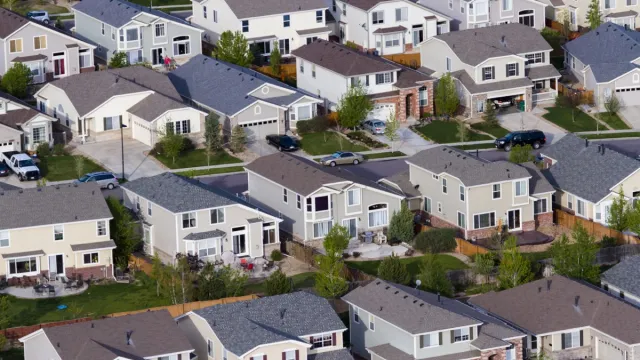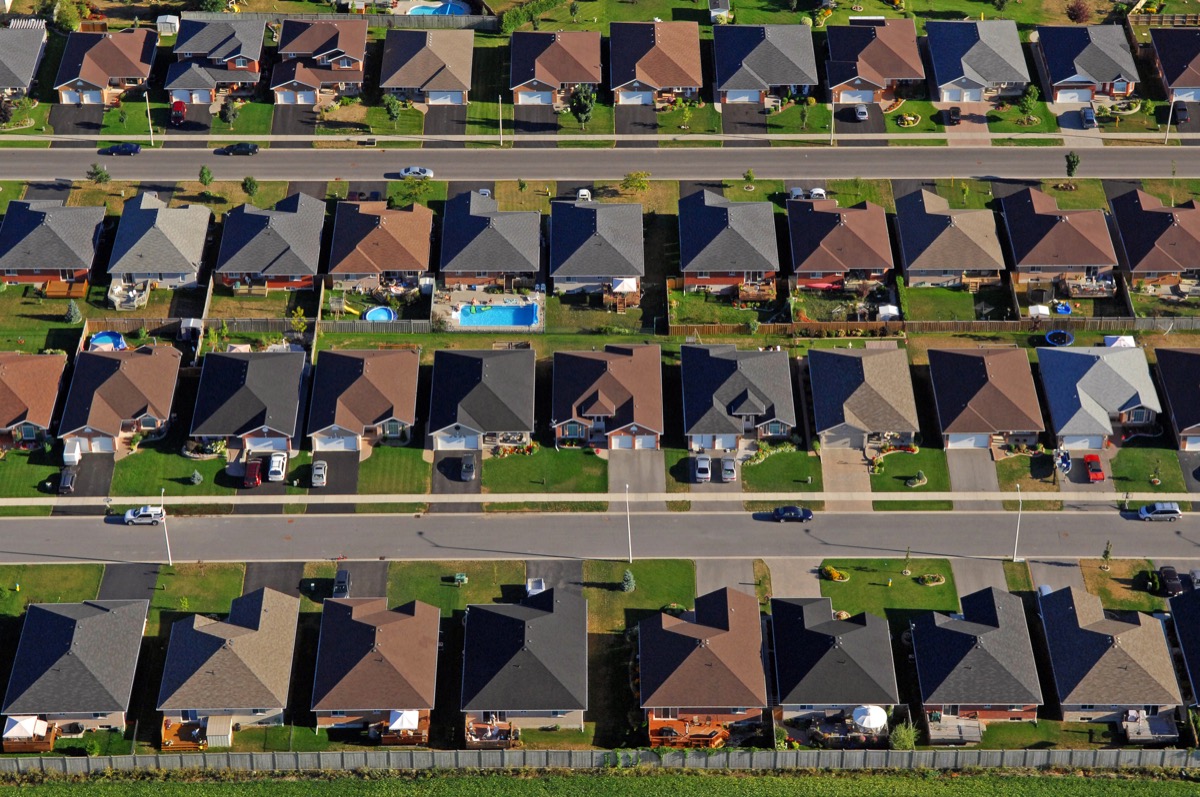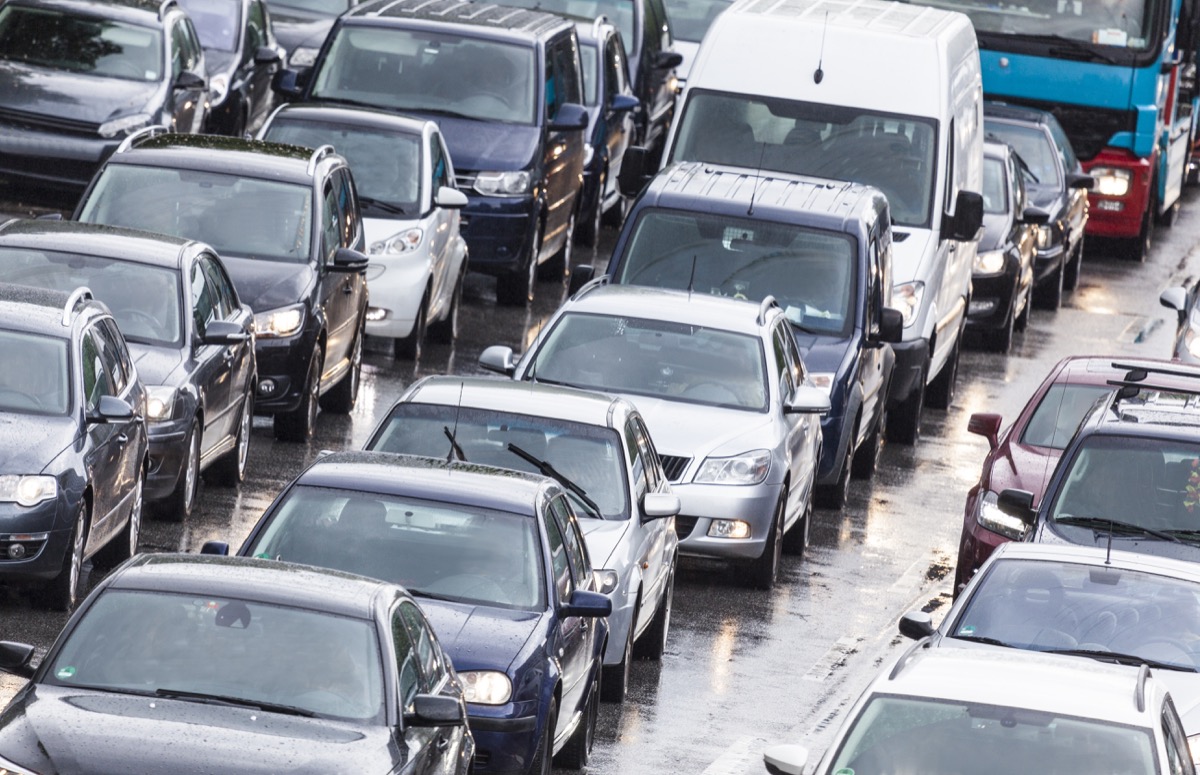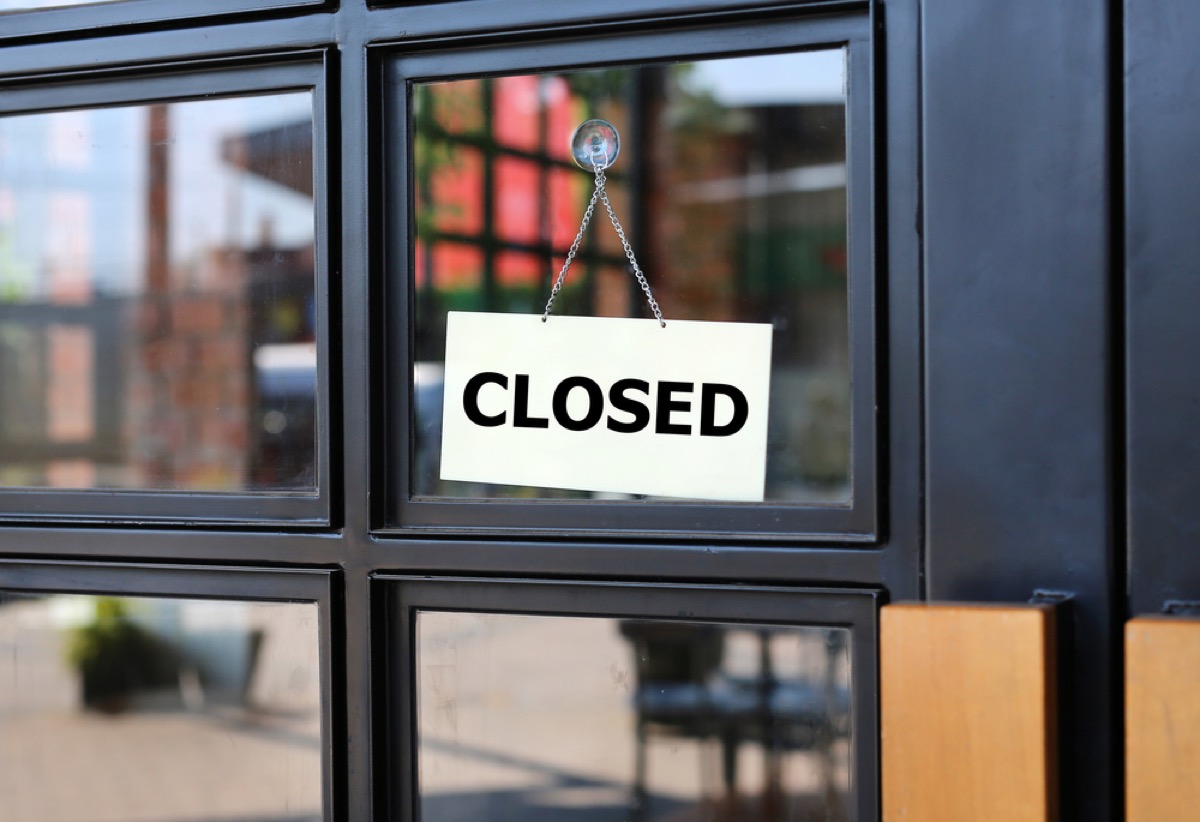The Worst Things About Living in the Suburbs

Suburbia has long been a punchline in America. It’s synonymous with homogenized neighborhoods, garish McMansions, and a minimal amount of entertainment options (other than sitting on your front porch and complaining about the Johnsons’ unkempt lawn, of course).
While many people assume the ‘burbs offer a better quality of life than high-density areas, even that’s not true. According to a 2017 study published in The Lancet, people living in urban centers tend to be both happier and healthier than their suburban counterparts. In other words, we don’t blame you if the idea of living in the suburbs makes you break out in a cold sweat. And if you want to be validated in your aversion, check out these 17 reasons life in the ‘burbs isn’t all white picket fences.
1
The architecture is cookie-cutter.

If you’re a fan of architectural diversity, the suburbs definitely aren’t the place to find it. Between planned communities where every house is exactly the same—down to the wallpaper in the living room—to entire neighborhoods built by the same developer, you’re far more likely to find block after block of cookie-cutter ranch houses in the suburbs than that Renaissance Revival home you’ve always dreamed of.
2
HOAs can make life miserable for homeowners.

Some think of homeowners associations (HOAs) as a good thing in terms of property value, but if you’re even the mildest non-conformist, they can be stifling. Do you really want to buy a house only to have to pay an HOA fee and have someone telling you how long your grass can be or what color you can paint your front door?
3
There’s a lack of diversity overall.

To this day, the suburbs have a disappointing lack of racial and socioeconomic diversity. According to a 2018 report from the Pew Research Center, 90 percent of suburban and small metro areas in the United States are predominantly white. And in many suburbs where single-family homes are the norm, it’s all but impossible for low-income families to find affordable housing.
4
Public transportation essentially doesn’t exist.

Having a car to get around is essentially a requirement in the suburbs, but that doesn’t mean everyone has the ability—whether financial or physical—to have their own car. And if you’re in that situation, you might spend a lot more time stuck at home or relying on the kindness of your friends and neighbors than you’d hoped since public transportation outside of major metro areas is nearly impossible to rely on.
As one reporter for The Week wrote in 2014, “There is little precedent for a transit agency effectively addressing a large, car-dependent suburban market”—which is just a more professional way of saying, suburbanites are stuck in their cars for now.
5
Traffic can be killer.

And with all those cars on the road, suburban traffic can be just as brutal as any you’d find in an urban area. As many a suburbanite can attest, trying to get down a suburban street when schools are letting out is akin to taking part in a “who can drive the slowest” competition.
6
Your workday will almost certainly be lengthened by your commute.

Sure, you might get more house for your buck in the suburbs, but you also get more of a commute to go along with it. According to a report from the Brookings Institution, between 2000 and 2012, the number of jobs within a typical commute distance of the suburbs declined by 7 percent, while urban dwellers saw jobs within commutable distances drop by just 3 percent.
7
Kids are dependent on their parents until they get licenses.

While backyards provide some respite for parents eager to get their kids out of the house, those who want to give them more independence than a patch of grass are out of luck. In an urban area, kids can hop on public transportation to get together with their friends, but suburbanites have to catch a ride with a parent (or older friend) to do pretty much anything until they turn 16 or 17.
8
You always have to get in the car to do something fun.

Want to go shopping, see a movie, or eat out at a restaurant? If you’re in the city, you can walk or take public transportation pretty much wherever you need to go, but in the suburbs, entertaining yourself almost always requires a trip in the car. And that means one thing…
9
A night out always requires a designated driver.

In a major city, you can have a few drinks, hop in a cab or on public transportation, and make it home safely. In the suburbs, unless you’re eager to risk your own life and the lives of others, you’ve got to choose a designated driver before you so much as take a sip of that rosé.
10
There’s a serious lack of anonymity.

In suburban communities, there might be one public school, one post office, one major supermarket, and a handful of bars or restaurants that you and everyone in the area frequent. And unfortunately, on those days when you just want to have your coffee in peace or flirt with someone at a bar without being the subject of local gossip, you’re out of luck.
11
There’s always that one nosy neighbor…

Sure, you may not have twenty-somethings making noise outside your door at 3:00 a.m. in the suburbs, but that doesn’t mean your neighbors don’t come with their own drawbacks. Like Jill, who lives across the street and who has never once allowed you to step out the front door without commenting on what you’re wearing, where you’re going, or why your azaleas don’t look as full as they did last year.
12
Yet, forming a community is harder than in a city.

In the city, you can walk into any gym, bar, or bookstore and strike up a conversation with a stranger. Want to do the same in the suburbs? Great! Get in the car and just cross your fingers that the aisles of your local Barnes & Noble aren’t totally empty.
13
Getting adequate exercise takes effort.

Walkable cities make getting daily exercise easy. In the suburbs, however, you might not even have a sidewalk to stroll on. That means moving your body enough throughout the day requires a vested effort to hit your local gym—which, of course, you’ll have to drive to… and see people you know at.
14
Everything closes so early.

Need a prescription filled after 7:00 p.m.? Want to grab dinner at 10? Feel like buying beer on a Sunday? While those things may be easy enough to do in an urban area, in many suburbs, you’d be lucky to find anything other than Walmart open past 8.
15
Takeout options are limited.

In most major cities, not only can you get Ethiopian or Sri Lankan food at 11:00 a.m. if that’s what your stomach wants, you can have it delivered to your door in under an hour. In most suburbs, even if there is a Thai place within an hour of where you live, chances are you’ll have to pick it up yourself.
16
And there’s a serious dearth of cultural activities.

Though there may be a movie theater or bookstore within the confines of your suburbs, odds are, if you want to go to a museum, gallery, or play, you’ll have to make the trek to the closest city. And with a lack of places for artists to show their work in the suburbs, you’re not as likely to have a diverse creative scene like you might in an urban area.
17
Urbanites assume you’re uncultured.

Whether your family has lived in the ‘burbs for generations or you recently left the city for a better school district or bigger house, there are a lot of assumptions made about people who choose to call the suburbs home. And while not everyone who favors the suburbs is doing so because they couldn’t hack it in the big city or don’t care about the arts, don’t be surprised if you run into people who assume that your choice to settle in suburbia means you’re some kind of rube. And if you want a bigger space of your own, check out The 50 Best Cities for Buying a Bigger House.
To discover more amazing secrets about living your best life, click here to follow us on Instagram!